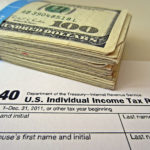Myths about discharging taxes in bankruptcy are as common as myths about fire-breathing dragons.
Central to the bankruptcy tax myth is the claim that taxes can’t be discharged in bankruptcy.
Not so. Bankruptcy can wipe out many kinds of taxes. And that discharge can restore order to a family’s economy.
Which ones are dischargeable? Let’s see.
Income taxes can be discharged
Three rules must be met to discharge income taxes.
- The return for the year in question was last due without penalty more than 3 years before the bankruptcy is filed.
- The return has been on file for at least two years.
- Any additional assessment of tax was made more than 240 days before filing.
Essentially, the most recent tax liabilities are protected from discharge. File the return and wait long enough, and a bankruptcy discharge will eliminate your liability for the tax.
In bankruptcy lingo, income taxes where the return was due less than 3 years before the bankruptcy filing are “priority taxes”.
Priority taxes are paid ahead of many other kinds of creditors in cases where a dividend will be paid to creditors in a bankruptcy case.
It’s important to note that you start counting the three years when the return was due, including extensions. Not from when it was actually filed, and not from the end of the calendar year.
Tax penalties can be discharged
If the tax is dischargeable, any penalty tied to that tax is also wiped out.
This is important since the penalties can often equal the tax that is unpaid, creating an impossible sum to repay.
The rule is more generous in Chapter 13: all unsecured penalties are dischargeable and penalties don’t have a priority for payment.
Filed return is required
The unstated requirement for discharging taxes is the filing of a return. Bankruptcy law provides no relief for those who neglect their obligation to file.
If a return wasn’t filed when due, then it must be on file for two years before the tax can be discharged.
Don’t think that you can “let the IRS file the return for you”. Unfortunately, that’s another myth. A “substitute for return”, prepared by the IRS when you don’t file a return simply isn’t treated as a “return” for bankruptcy purposes.
No return, no discharge of that year’s taxes.
Recently assessed taxes survive bankruptcy
The final rule for determining whether a tax is dischargeable looks at whether the tax was assessed within 240 days of filing. Taxes assessed within that period don’t get wiped out in bankruptcy.
Pinning down the precise date of recent assessments make it important to get a tax transcript from the IRS. That transcript will show the history on each year for which there are unpaid taxes.
You can discharge taxes in bankruptcy
So there you have the three broad rules that govern the discharge of income taxes in bankruptcy. This is the law, so things aren’t always as simple as these rules promise. The rules do cover most of the tax and bankruptcy situations involving income taxes.
If old taxes are a problem, get an experienced bankruptcy attorney to assess whether bankruptcy will get you out from under tax debt.
More
Chapter 13 is an alternative to offer in compromise






